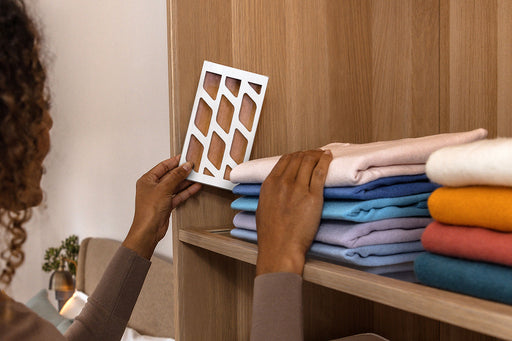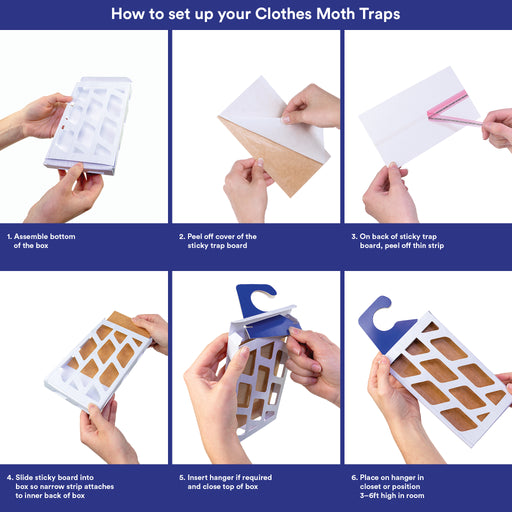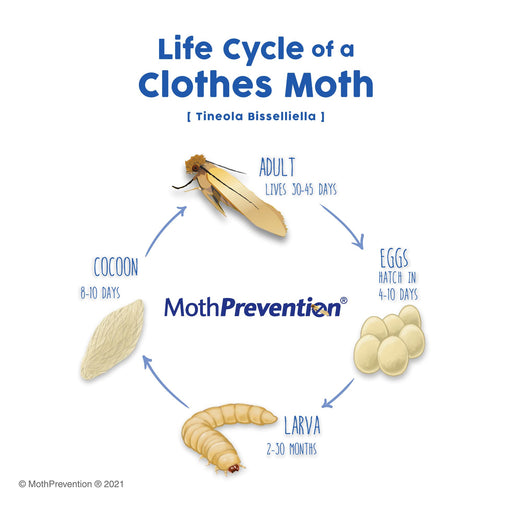How To Maximize The Effectiveness of Your Moth Traps

How Moth Traps Work:
- Our clothes moth traps work by attracting the adult male textile moths in your home to the pheromone embedded in the sticky strip. There are no insecticides at work here - our traps are completely non-toxic, natural and safe for you, your family and your home
- As males become trapped on the sticky strip there are fewer to successfully seek out females. The end result is fewer eggs, larvae, moths!
- Moth traps remain active for 3 months once activated, allowing you to have a serious impact on the moth population in your home and monitor activity over a long period.
How To Assemble Our Moth Traps:
Assembly of our traps could not be simpler. Just a few simple steps and you’re ready to get rid of the moths in your home.

Where To Position Moth Traps:
Clothes Moths & Carpet Moths are sensitive to certain environments. For your clothes moth traps to work as effectively as possible it’s important to consider the following when positioning them:
- Where possible place traps at between 3-6ft high. This is the flight height of the male moth
- Position traps in ‘quiet’ areas. Moths prefer to be where they can remain undisturbed. You increase your chances of catching moths by placing traps in ‘low traffic’ areas of your home
- Keep traps away from direct light or draughts. Moths are nocturnal and like to be in dark, still places - where your trap should be!
- Avoid cancelling out the effectiveness of ‘ATTRACTING’ Clothes Moth Traps by keeping them away from any moth ‘REPELLENTS’ that you may have. Moth repellents are products such as lavender sachets or cedar wood
- If placing traps on a rail within a closet make sure that the closet is not overcrowded with garments. There should be space within the closet for air to circulate freely - allowing the pheromones within the traps to flow around the closet and attract the moths within.
- Don’t be afraid to move traps around if they are not catching! If after a week you’ve not caught any moths on a trap consider moving it to a new location. It's always worth moving them around to try their effectiveness in a different part of the room
We understand that it can be a frustration and feel like an invasion when you have moths in your home - you’ll want them gone immediately! But traps can sometimes take time to attract and catch the adult males. Please consider that if you go around killing the moths in your home you will ultimately reduce available moths to juveniles. Juveniles will not be attracted to your traps until they mature - Killing moths by hand will affect your catch rate and not help you with moth monitoring.
Using Traps To Monitor For Moth Activity:
Your traps will help you twofold:
- They will remove the male moths from the breeding cycle - slowing down the rate at which the moths can create the next generation
- They will allow you to monitor the amount of moths being caught on your traps over time. We recommend that you keep a diary of moths caught over time - this will help you to understand whether your infestation is growing, remaining about the same, or hopefully in decline. Anything other than in decline means that you should consider additional cleaning or further investigation - See our Blog Post How To Stop Moths Eating Your Clothes - 10 Steps To Clothes Moth Prevention for help in this area
You Might See Moths, But Not Be Catching Anything:
Please keep in mind that traps only capture adult male textile moths. If you have juvenile, female or non-textile moths in your home they will not be attracted to your traps - for this reason it is possible to see moths, but not catch moths.
There may be a lull in the ‘Life Cycle’! Simply put, larvae will only pupate and hatch as moths when the conditions are right! This means that you may see a lot of moths at a point in time, nothing for a while afterwards, and then repeat! This can be influenced by the weather, seasons and how warm your home is.
The moth cycle will slow down during the late Autumn/Fall through to early Spring as the weather gets colder. A reduction in the number of moths caught does not mean that your traps are not working for you - You’ve just monitored a Lull in the Life Cycle!

Importantly, within our cosy homes during winter the weather outside does not always have such an impact on slowing down insect activity. Moth larvae might continue to pupate and hatch as moths from late Fall through to next Spring! For this reason we recommend keeping traps ‘active’ by replacing any old Strips with new Replacement Strips every 3 months.
Allow time, be patient, reposition, monitor, respond.
Our Traps Are Refillable
Unlike other brands our Clothes Moth Traps are reusable / refillable! You can use our Moth Trap boxes again and again.
Refills are always readily available, guaranteed to save you money, and mean that you can always have traps in place to protect your home.
Changing your old strips for new ones is quick, simple and clean. And, you can easily recycle your old strips - No plastic and no toxic content to worry about.
What If You’ve Found Damage Or Larvae?
Although Moth Traps are vital to breaking the breeding cycle you sadly cannot always remove an established moth infestation with traps alone. Finding holes in your woollens or loose fibers around the edge of carpet is an identifier that you have moth larvae in your home. For a larger infestation you may like to read our Carpet Moths Kit Guide for information on how to use chemical products in line with our Traps to rid your home of Carpet Moths.
For information about why you should choose MothPrevention Moth Traps please read this post: Why Choose MothPrevention Moth Traps.
We’re always here for you - if you need further help and / or guidance, or not seeing the results you’re expecting please reach out to us.
FAQs
Where is the best place to position Moth Traps?
The best place for the Clothes Moth Traps is about 3-6 feet above floor level (the height moths fly), on a shelf, on top of a wardrobe, or even hanging from a hook. The ideal position for the Moth Trap is away from direct light, highly trafficked areas, or circulating air (drafts, A/C, ventilation, open windows). Don’t place the traps near moth repellents or scents like lavender and cedar.
If you are placing the Moth Trap in your wardrobe or closet, use the integral hanger. Don’t surround the trap with clothing, since that will limit the ability of the pheromones to circulate freely.
Lastly, keep Moth Traps away from children and pets. While non-toxic, our Clothes Moth Traps are very sticky!
What do I do after putting a Clothes Moth Trap in place?
We recommend you make a note of the date you set the traps and check them weekly. Keep track of how many moths you are catching to determine if your infestation is getting worse or if you are in control. The traps will last for 12 weeks after activation.
Some things to keep in mind:
- If the catch rate increases, it could mean that your infestation is getting worse. In this situation, we recommend reading our Clothes Moth Kit Guide, which gives you guidance about using chemical products in line with our Traps.
- If the catch rate declines, good job! You’re taking control of the situation.
- If you don’t catch moths within a week, relocate the traps in areas you suspect that moths may be present. If you still don’t catch any moths, this is a sign that there are no adult male sexually active moths in the vicinity.
Why are my Moth Traps not catching anything?
There could be a few reasons why your pheromone traps aren’t catching moths:
- There are no adult sexually active male moths to attract. That’s good news! Your Moth Traps aren’t correctly positioned. Clothes Moths prefer darker, undisturbed areas, so you might need to place your traps somewhere more secluded.
- Your traps are located near other repellents, such as lavender and cedar, and can’t work efficiently. Consider removing cedar chips or scented sachets from the room or relocate your traps.
If you move the traps and still don’t catch any moths, it means that either the infestation is under control or there are no adult male moths active at that time. Don’t remove your traps just yet! Immature male moths could still be present and won’t be attracted to the trap until they have fully matured.
How do pheromone Clothes Moth Traps work?
Clothes Moth Traps utilize pheromones (female moth hormones) to attract the adult male moths to the sticky card. This helps break the breeding cycle.
What should I do if I catch moths with the trap?
If you find even a single moth in your trap we recommend that you start looking for evidence of an infestation. Remove your clothing from your wardrobe and drawers and check for signs of damage, such as webbing and holes. Look along the creases, folds, and seams. If you find any infested items, hot wash them if they aren’t badly damaged.
Prepare for some thorough cleaning! Hot laundering and dry cleaning will kill any eggs or larvae on clothing. Also wipe down shelves and vacuum carpets, closets, flooring, vents, under furniture and any places where lint from clothing accumulates.
How many traps should I use?
A single trap works in a space of 12×12ft, so you can begin with a single trap wherever you suspect moths are present. It is not a problem to have more than one trap in a room - Adult male moths will simply head to which ever trap is closest to them.
How long do the moth traps last?
Left unopened, our pheromone Moth Traps last between 2-3 years. Check the expiry date on the back of the packaging if you’re not sure.
After you open the packaging and remove the protective strip, the pheromone traps remain active for about 3 months, after which they won’t be so effective and should be replaced.
Which moths are attracted to the pheromone traps?
Clothes Moth Traps are designed to attract mature adult male Clothes Moths, also known as Textile Moths. The species of Moths they attract are as follows;
- Common Clothes Moth (also known as Webbing Clothes Moth or Tineola Bisselliella)
- Case Bearing Moth (Tinea Pellionella)
- Brown House Moth (Hofmannophila Pseudospretella)
- White Shouldered House Moth (Endrosis Sarcitrella)
Clothes Moth Traps do not attract Indian Meal Moths, Mediterranean Flour Moths, or any other type of insect such as carpet beetles or spiders. Female moths, eggs, larvae, and non-pest insects won’t be affected by these traps.
I’m using the traps but still finding damage. What am I doing wrong?
If you are only using moth traps to control an established moth infestation in your home, you won’t be getting to the root of the problem which is caused by the larvae eating their way through your clothing and textiles. Although your traps are attracting and catching the adult male moths there could still be larvae active within your wardrobes, closets, and garments.
Moth Traps work by eliminating male moths. They help to break the breeding cycle because moth eggs can’t be fertilized, decreasing the rate of infestation.
For larger and more persistent infestations you may like to consult our Clothes Moths Kit Guide, and our Carpet Moths Kit Guide which gives you guidance about using chemical products in line with our Traps.
Do moth traps work?
Yes, pheromone moth traps can be effective in catching clothes moths, carpet moths, and pantry moths in the home. These traps work by using synthetic sex pheromones to lure male moths into the trap, where they become stuck to a sticky adhesive. Without male moths to mate with, the female moths are unable to reproduce, helping to reduce the population of these pests in your home. However, it is important to note that moth traps alone may not be enough to fully eradicate an infestation and need to be used in combination with other pest control methods such as proper storage of food and clothing, vacuuming, and, for large infestations, possibly professional pest control services.
About MothPrevention
MothPrevention® speak to customers every day about their clothes moth issues - clothes moths are a species that are ever increasing and that can cause significant damage to clothes, carpets and other home textiles.
To date, we’ve helped over 250,000 customers deal with their moth problems. We have developed professional grade solutions including proprietary pheromones and trap design, not available from anybody else in the USA.





